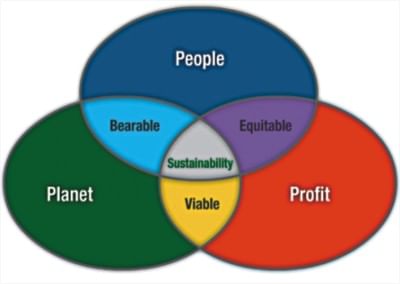Bottom line

A research conducted in 2000 by Sarah Anderson and John Cavanagh of Institute of Policy Studies revealed some interesting facts about the strength and power of large corporate houses. Whether we believe it or not, of the 100 largest economies in the world, 51 are businesses; the other 49 are countries.
Could these mighty corporate houses be merely categorised as 'business'? In the backdrop of the influence of the corporate houses on civilisation and for the sustainability of their business, the conventional perspective of business to make profit only is changing.
The challenges of the 21st century are requiring businesses to fundamentally change the way they operate. Issues such as climate change, natural resource depletion and the energy crisis are hitting organisations head on and demanding that attention be paid to aspects of business beyond quarterly financial results.
It is no longer acceptable to simply maximise short-term shareholder value. Instead, firms must pay attention to economic, social and environmental effects of their operations -- referred to as sustainability or corporate social responsibility.
This concept is popularly known as 'Triple Bottom Line' (TBL) -- organisations focus not just on the economic value they add, but also on environmental and social value. The three lines represent society, the economy, and the environment. Society depends on the economy, and the economy depends on the global ecosystem, whose health represents the ultimate bottom line.
'Sustainability' is key in today's business world. One of the most frequently cited definitions of sustainability is, “Operating in ways that meet the needs of the present without compromising the ability of future generations to meet their own needs.” The underlying meaning is that we have to protect the 'place' where we operate and the 'people' who run the business. Unless we do that, we will eventually end up with an environment that is extremely difficult to live in.
For the sake of the existence of the business, issues like research and development of new products that do not emit toxins or use non-renewable materials; innovation and creativity, where organisations figure out ways of using or minimising waste; marketing and advertising that addresses or supports local issues and social causes; and increased stakeholder engagement, creating dialogue with community partners, suppliers, competitors, customers and representatives for the natural environment have to be dealt with utmost importance.
Some recent studies show organisations that adopt the TBL approach, earn more revenue and gain more market share, their employee retention is comparatively much higher and they enjoy greater community support. What are the rationales behind these advantages? In the modern world, consumers are getting equally concerned about the society and environment. Everybody wants to live in a place, which is conducive to living not only for themselves but for their future generations at the same time. Naturally, consumers are responding positively to TBL efforts, which are in turn helping companies to increase revenue and to gain market share. Large firms are putting more and more resources in R&D to comply with the social and regulatory requirements.
The ultimate results of these researches help them to explore new market opportunities with innovative products and in many of cases, guide them to drive cost saving initiatives.
Quite a number of firms are realising that having a strong sustainability or CSR programme helps with both recruitment and retention of talent. A recent study by Stanford University shows that MBA graduates will take lower in annual salary to work for a 'responsible' company (CSR Reputation Effects on MBA Job Choice, Stanford University, 2003). Another study found that employees in companies with strong sustainability programmes are happier, more satisfied and have longer retention rates (Corporate Responsibility: Burden or Opportunity, BusinessWeek Research Services and Grant Thompson, 2007).
Local communities can have a strong influence on a firm's 'freedom to operate'. If a company engages the community around their environmental and social impacts and its role in addressing community issues, it presents the company as a good corporate citizen and partner, thus opening the door for dialogue and positive stakeholder relationships.
The TBL perspective also results in organisations avoiding regulatory issues, bad publicity and angering special interest groups. Organisations that support the community affect their surroundings beyond the walls of the organisation, through educational development, charitable events and visibility of issues. A by-product of these advantages is reduced risk, which means that organisations incorporating triple bottom line efforts are seen as safer investments, making it easier for them to procure funds.
The challenge of course lies with incorporating TBL principles into an organisation's operations. It requires guts from the top management, with focused commitment and long-term strategic thinking. Any business implementing a new way of doing things faces obstacles and challenges. One of the biggest obstacles to drive changes is a lack of understanding and awareness among the employees regarding new things. It requires a lot of effort to get people out of their comfort zone.
Taking care of profits, people and the planet are critical to organisational success, both now and in the future. Leadership plays an all-important role in driving and implementing any change or new programme. The sooner the business leaders adopt TBL concepts, the better for the sustainability of the business.

 For all latest news, follow The Daily Star's Google News channel.
For all latest news, follow The Daily Star's Google News channel. 



Comments